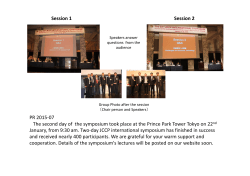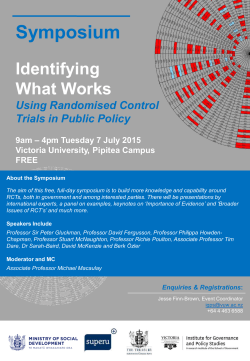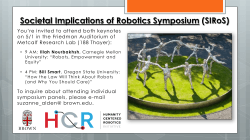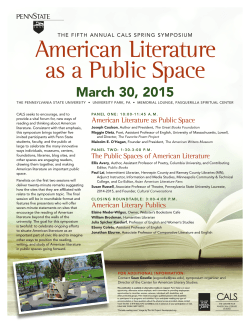
1 Symposium on youth participation in a digitalised world Concept
Symposium on youth participation in a digitalised world Concept paper (24/04/2015) Background: The youth partnership between the European Commission and the Council of Europei in the field of youth, as agreed between its partner institutions, has developed a "think tank" function aimed at increasing the knowledge about the contexts and needs of young people in Europe as well as current and upcoming challenges they face. The knowledge produced supports activities of the EUCoE youth partnership, the partner institutions and their relevant structures and is disseminated to other relevant actors in the youth field. This working priority is in line with the current political key priorities of the two partner institutionsii, namely, • • for the European Commission: creating more and equal opportunities for all young people and promoting social inclusion, citizenship, and participation of all young people in various aspects of society; fostering cross-sectorial cooperation through partnerships between different actors involved in delivering support to young people; further developing expertise and availability of examples of best practice in these areas; strengthening the evidence base of youth policy and sharing examples of good practice through mutual learning; understanding the challenges youth face and identifying their expectations towards policy-makers and providers of support services to young people. for the Council of Europe: fostering democratic innovation and participation as well as cultural diversity and intercultural dialogue in socially cohesive societies; providing democratic competences in education, youth and civil society; supporting and improving young people’s access to social rights; empowering and protecting vulnerable groups and minorities; contributing to young people’s autonomy and a better transition from education to working life and the labour market; developing youth policy responses to exclusion, discrimination and xenophobia, in particular in disadvantaged areas and for vulnerable groups. 1 Objectives under this working priority: To systematise, increase and disseminate the knowledge on and understanding of young people in Europe and beyond, with a focus on their participation and social inclusion To identify, analyse and present good examples of practice in youth work and youth policy relevant to these core themes To identify main challenges, draw conclusions and formulate recommendations, as well as to propose models of youth policy and youth work interventions To support the knowledge-based youth policy and practice through networking, dialogue and dissemination of knowledge and examples of good practice, including contributing to mutual learning. Youth participation has been largely addressed over the last 20 years and particularly in 2014 by the reflection group on youth participation organised by the EU-CoE youth partnershipiii. This reflection group discussed a number of analytical papers, which led to policy recommendations. In addition, the findings of this work were compared to the results of the multilateral cooperation project on youth participation organised by the German National Agency for Erasmus+/Youth in Action, which led to the joined recommendations “Amplify participation of young people in Europe”. In 2015 this work is to continue by focusing the reflection on participation and democratic governance in the digitalized world and the role of youth policy and youth work in this respect. Purpose: The EU-CoE youth partnership will organise a symposium on youth participation in the digitalised world to answer questions coming from some recent events and activities, most prominently the World Forum for Democracy, November 2014 in Strasbourg, the Council of Europe No Hate Speech Campaign and the results of the study “Youth Participation in Democratic Life” , published by the European Commission in 2013. Entering into a digitalised world including new ways of communication and educational approaches, different economic settings, political relationships and representative structures has a crucial impact on (democratic) societies and forms of governance. In the context of growing political and social extremism across Europe, challenging the existing democratic systems, the symposium will allow deepening the reflections on youth participation and the future of democracies in the digital era, on chances and risks stemming from these developments that young people are facing. It will evaluate the young people’s needs and aspirations, identifiable tendencies and prognosis. Related policies and practice examples will be shared and discussed. Besides experts in the field of youth policy, representatives of related policy sectors such as child protection, cybercrime, digital agenda for Europe etc. will be invited. An analytical paper will be elaborated by expert(s) to feed the reflections and discussions during the symposium. It will then be finalised following the event, taking into account its findings and conclusions. The key messages that it will contain will then be widely disseminated. A concise report of the symposium will also be produced. The symposium will be the major event of the EU-CoE youth partnership in 2015 and organised in link with the annual meetings of the Pool of European Youth Researchers (PEYR) and the correspondents of the European Knowledge Centre for Youth Policy (EKCYP). 2 The concept of participation Participation of young people is to be understood as broad as possible. In the recommendations of the above-mentioned Reflection Group on Youth Participation it was reiterated that the forms and arenas of (youth) participation should be acknowledged and promoted in all their diversity, meaning old and new forms of participation, in both rural and urban settings, in daily and community life, in educational and work settings, in public spaces, youth care and welfare systems, in civil society, (sub-) cultures and as collective or individual expression across political, social, individual and virtual contexts. Thus participation must be promoted for all youth, organised and non-organised, in cities and remote areas, regardless of gender and age, and with particular attention to ‘virtually disconnected’, disabled, disadvantaged, marginalised, disenfranchised youth, e.g. migrants, refugees, asylum seekers, youth in care systems… Understanding participation is a pre-condition for further developing structures of democratic governance at all levels, be it local, regional, national or international. Voting on- or offline is only one element in representative democracies. “Open” participation in terms of power sharing / codeciding, civic and social movements, direct democracy and even individual (and sometimes illegal) forms of participation, such as hacking, graffiti, body painting should also be considered. As an example, the guidelines for e-participation by young people in decision-making at all levels, developed in a multilateral cooperation project of IJAB- International Youth Service of the Federal Republic of Germany in 2014, distinguish between two dimensions: direct, or transitive eparticipation online means, political decisions are influenced directly and structural links to political decision-making processes are enabled; indirect, or intransitive forms of e-participation reach out to internet users and encourage them to support certain issues and positions and thus contribute to the development of political opinion. The usage of social media and the Internet is a good example of opportunities that young people eagerly take (like in the Arab Spring and other social movements around the world) but also the threats that they often face. On the one hand side they allow expressing one’ opinions easily, sharing ideas and organising quickly large number of like-minded people, on the other they carry the risk of on-line hate speech, bullying and other sorts of crime as well as surveillance There are also diverse other barriers to e-participation, which young people are facing. Consequently, reflecting on youth participation and democratic governance it is not about how to bring young people to vote, but how to support them in becoming / being active, critical, autonomous citizens, aware of underlying democratic values. These ideas and the draft programme including its four thematic areas (see next chapter) has been developed by a small expert group coming from diverse professional backgrounds; this expert group supports the reflections on content, methodology and experts / speakers to be invited throughout the process. 3 Programme The programme of the symposium will be grouped around four thematic areas that are crucial for the digital age in relation to the participation of young people (and democratic governance): - Communication: trends in information and communication technologies, (new) ways to communicate via social media and of getting informed, digital competencies, innovative communication for fostering participation and engagement, freedom of expression vs. control, outreaching to diverse target groups. - Education: new ways to learn and teach, online / e-learning vs. face-to-face learning, individual vs. collective learning, learning to participate, digital literacy, the potential of democratic and participatory pedagogies, both in formal and non-formal settings, learning to be critical or adjusted citizens, future of citizenship education, open education resources for sharing, disseminating and collaborate on educational content and methods - Economic sphere and working life: new ways of working, e.g. telework, new working relationships: individualisation vs. collective employees representation, flat hierarchies vs. hierarchical command structures, network structures and shared responsibilities, new forms of entrepreneurships, changing work spaces, new economic formats and methods like crowdsourcing approach, using collective intelligence - Democracy and Political Participation : diverse forms of democracy: representative vs. direct democracies, open vs. repressive societies; local, regional, national and international levels of governance; role of civic and social movements, new forms of expression and engagement, protection of human rights, freedom of expression online, freedom of assembly and association online, perspectives of “Post-Democracy” and what comes after? Discussions on these four areas will look from two perspectives: chances and opportunities and risks and threats for young people and follow the questions “Where do we stand today?” and “What are the perspectives and visions?” Draft structure of the programme 14 September 2015, afternoon: - Opening by the Secretary General of Council of Europe and the EU Commissioner for Education, Culture, Youth and Sport - Questions & answers, dialogue between participants and VIPs - Two keynote speeches: by researcher and by youth representative - Getting to know the participants of the symposium - Introduction to the programme Evening: Reception to celebrate the 20th anniversary of the European Youth Centre Budapest 4 15 September 2015, full day Four working sessions of 1 hour and 45 minutes each will be dedicated to the four main topics, each introduced by one speakers in the first session. Various labs in semi open spaces will then follow. 09h00 – 10h45: Working session I “Communication” 11h15 - 13h00: Working session II “Education” 14h15 - 16h00: Working session III “Economic sphere and working life” 16h30 - 18h15: Working session IV “Democracy and Political Participation” 16 September 2015, morning - Inter-active summing up - Drawing joint conclusions - Closing Expected outcomes: A better understanding of tendencies and prognosis, chances and risks for democracy in a digitalised world is achieved and resulting strategies for youth policy and youth work are discussed A short and concise report on the inputs and main findings of the symposium is drafted and made available online An analytical paper summarizing the state of affairs in the debates around the topic of participation in the digitalized world and stating further needs for policy and practice is produced. Participants 110 Participants will be selected / invited by representing the areas of policy, research and practice in the field of youth (YNGO, youth workers, developers, trainers, campaigners) as well as experts from related fields (media, economy, education, information society, youth, data protection, cybercrime). The majority of participants will be selected based on a call for participation. The Pool of European Youth Researchers (PEYR) and the correspondents of the European Knowledge Centre for Youth Policy (EKCYP) will be actively involved throughout the event Online e-participation Besides the presence of approximately 110 participants in the symposium an online participation will be organised in order to allow the active e-participation of more interested participants, coordinated by an online facilitator. 5 Timeline: 1st April (full day), 2nd April (morning) 2015 25th June (full day), 26th June (morning) 2015 14th (afternoon) till 16th September (morning) 2015 Week 43 1,5 day preparatory meeting with experts, Strasbourg 1,5 day preparatory meeting with experts and facilitators, Budapest Symposium “Youth Participation in the digital age”, Budapest The analytical paper and the symposium report are made available online and distributed to a larger audience Costs Board and lodging during the symposium will be provided and travel costs will be covered for invited participants and experts. Working language The symposium will be held in English. Further reading / documents EU-CoE youth partnership: Reflection Group on YOUTH PARTICIPATION Revisiting youth participation: current challenges, priorities and recommendations: http://pjp-eu.coe.int/en/web/youth-partnership/reflection-group Multilateral Cooperation Project (MCP) “Participation of young people in the democratic Europe” and EU-CoE youth partnership Reflection Group: “Hear my voice! Amplify participation of young people in Europe!” brochure and video http://pjp-eu.coe.int/en/web/youth-partnership/reflection-group EU-CoE youth partnership policy sheet: Citizenship and Participation by Lihong Huang http://pjpeu.coe.int/documents/1017981/1663182/Citizenship+and+Participation+2014+by+Lihong+Huang/c6 75b289-7667-4850-be31-7719c8d12d65 Non-exclusive list of material and documents for further reading (to be complemented) http://pjp-eu.coe.int/en/web/youth-partnership/reflection-group Guidelines for successful e-participation by young people in decision-making at local, regional, national and European levels and youthpart – e-participation at the local level https://www.ijab.de/en/youthpart/ 6 Guidebook on social media and youth participation (from a South Mediterranean perspective) http://pjpeu.coe.int/documents/1017981/1668209/Social+Media+youth+participation_2013.pdf/6aa795c2b9c8-485c-b6f7-f4175aed64a5 Danube University Krems, International Conference for E-Democracy and Open Government 2015 http://www.donau-uni.ac.at/en/department/gpa/telematik/edemocracyconference/edem/vid/20773/index.php?URL=/en/department/gpa/telematik/edemocracyconference/20773&cursor=12 Guide to human rights for Internet users http://www.coe.int/en/web/internet-users-rights/guide Report from Berkman Center “Digitally Connected: Global Perspectives on Youth and Digital Media” http://papers.ssrn.com/sol3/papers.cfm?abstract_id=2585686 References i http://pjp-eu.coe.int/en/web/youth-partnership/ ii European Union COUNCIL RESOLUTION of 27 November 2009 on a renewed framework for European cooperation in the youth field (2010-2018) - 2009/C 311/01 http://eur-lex.europa.eu/legalcontent/EN/TXT/?uri=CELEX:32009G1219(01) 2012 Joint Report of the Council and the Commission on the implementation of the renewed framework for European cooperation in the youth field (2010-18) - 2012/C 394/03 http://eurlex.europa.eu/legal-content/EN/TXT/?uri=uriserv:OJ.C_.2012.394.01.0005.01.ENG General Information on EU Youth Strategy provided on webpage: http://ec.europa.eu/youth/policy/youth_strategy/index_en.htm Council of Europe 8th Council of Europe Conference of Ministers responsible for Youth, Ukraine 2008: Declaration “The future of the Council of Europe youth policy: AGENDA 2020” http://www.coe.int/t/dg4/youth/IG_Coop/Agenda_2020_en.asp 2014‐2015 priorities of the Council of Europe’s Youth Sector http://www.coe.int/t/dg4/youth/Source/Coe_youth/Youth_sector_priorities_2014-2015_en.pdf iii Information on the findings of the reflection group on youth participation are available at: http://pjp-eu.coe.int/en/web/youth-partnership/reflection-group 7
© Copyright 2025









